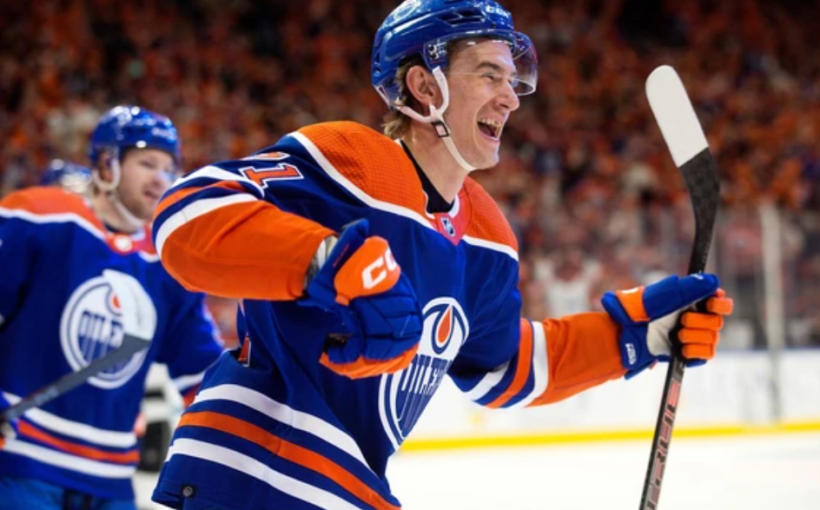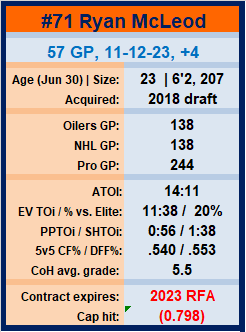Stick tap to Ryan Rishaug of TSN who had the major details about 25 minutes before the Oilers made it official.
McLeod set the process in motion by filing for arbitration in early July, at which moment it was guaranteed he would remain with the Oilers. But at what price? It’s another summer where cap space is very tight, a lesson McLeod himself learned the hard way a year ago. Then an RFA with no arb rights, he waited the entire summer without a contract, hoping against hope that Ken Holland might make some sort of trade to open up a smidge more cap space. Instead, in literally the final hour before the team took to the ice for training camp, McLeod signed a one-year extension for the precise figure of $798,000. It turned out that was the exact figure that allowed him (and others) to shoehorn onto the opening day roster with pocket change to spare.
That was seen by many including this observer as the player doing the team a solid, even as it was in his own interest to keep himself affordable. (An approach that doesn’t seem to have occurred to Raphael Lavoie.)
After sending McLeod to the minors early in the 2021-22 season not because he lost his job but because he was waiver-exempt, and after low-balling him on a eam-friendly deal in 2022-23, GM Ken Holland surely had no intention of taking this all the way to arbitration. In such hearings, it is the team’s responsibility to explain why a player is worth a lower salary than he thinks he is. It can get ugly, or so I’m told.
Imagine, for example, having to point out to a third party that the fine young player in question had zero goals in 12 playoff games, and just 1 in the final 17 of the regular season. Feelings might be bruised.
Several items that player and organization can surely agree on at the fundamental level:
- he’s a fine young player who is improving year over year
- his plus speed and overall skating chops are his primary athletic asset
- his situational strength is transporting the puck
- he’s shown promise as a penalty-killer
- the physical element of his game is progressing but remains a focus for further improvement
- he’s still got work to do at the offensive end of the sheet especially in tight to the net
For now McLeod projects as a 3C which is exactly what Oilers need. $2.1 million is a reasonable price for a solid 3C, assuming that McLeod continues to grow his game to become that player.
From this distance that’s a pretty safe bet. McLeod’s trajectory has been pretty much up, up, up since the Oilers drafted him early in Day Two of the 2018 Draft, #38 overall for what many evaluators considered a first-round talent. He got bounced around during his development years with a large assist to COVID, as can be said about many young players these days, moving from Mississauga to Saginaw to Bakersfield to Zug, Switzerland to Bakersfield to Edmonton to Bakersfield yet a third time before getting recalled for good early in 2021-22.
Put another way, 2022-23 was the first season in the five since he was drafted that McLeod played no games for the Condors. At first glance, his numbers barely moved, from 9-12-21 in his rookie year to 11-12-23 as a sophomore; the issue here is that McLeod suffered a pair of injuries that each put him out for roughly a month, and played just 57 games after reaching 71 as a rookie. It follows that his per-game outputs were significantly better: G/GP jumped from 0.13 to 0.19, P/GP from 0.30 to 0.40. Perhaps the cleanest comparison is prorated boxcars per 82 GP:
- 2021-22: 10-14-24, -5
- 2022-23: 16-17-33, +6
McLeod did most of his damage at even strength (20 points; the other 3 came on the penalty kill). At 5v5 his goals per 60 surged by 50% from 0.56 to 0.84, his points /60 from 1.29 to a very respectable 1.86.
His underlying numbers also improved. While his on-ice share of shot attempts remained flat at 54% which is very good, other important underlying numbers soared: high danger shot share from 49% to 58%, dangerous Fenwick from 50% to 55%; expected goals from 46% to 52%. These latter three are all ways to measure the most dangerous shots, and in all three the Oilers performed significantly better during McLeod’s minutes this past season. Lo and behold, he switched from a minus to a plus player both on the traditional scale and at 5v5.
Instead, McLeod and Foegele were the mainstays of what became an effective third line for the Oilers. They played over 5 hours together at 5v5 with a variety of RWs (Puljujarvi, Janmark, Ryan, Yamamoto), posting strong possession numbers with all of them. McLeod’s blazing speed was central to the line’s identity and its admittedly modest success. Just look at those names, McLeod most definitely included, and there are not a lot of natural finishers among them. But they sure did make stuff happen out there, and didn’t give up a whole lot.
Now that they are a line with two $2+ million players on it, so the bar of expectations is set a little higher, for outplaying and outscoring both.
McLeod has emerged as an all-purpose player who averaged >2½ minutes per game on special teams, notably on the PK where his ice time got a 50% bump. He got an occasional switch to left wing in the top 6, but 3C was his core position. One thing to watch is how his usage compares to Dylan Holloway, another good young left shot forward who, like McLeod projects as a bottom-six centre, top-six left wing, and a regular on special teams.
From a team perspective, getting that second year is a very big deal. Now attention can be focused on the situation involving Evan Bouchard, the last RFA to remain unsigned. At least Holland is now working with a known amount of available cap, even as he has no desire to use all of it.
In the case of promising young forward Ryan McLeod, that announcement was made tonight, just a couple of days ahead of McLeod’s pending Judgment Day of Aug 04.





